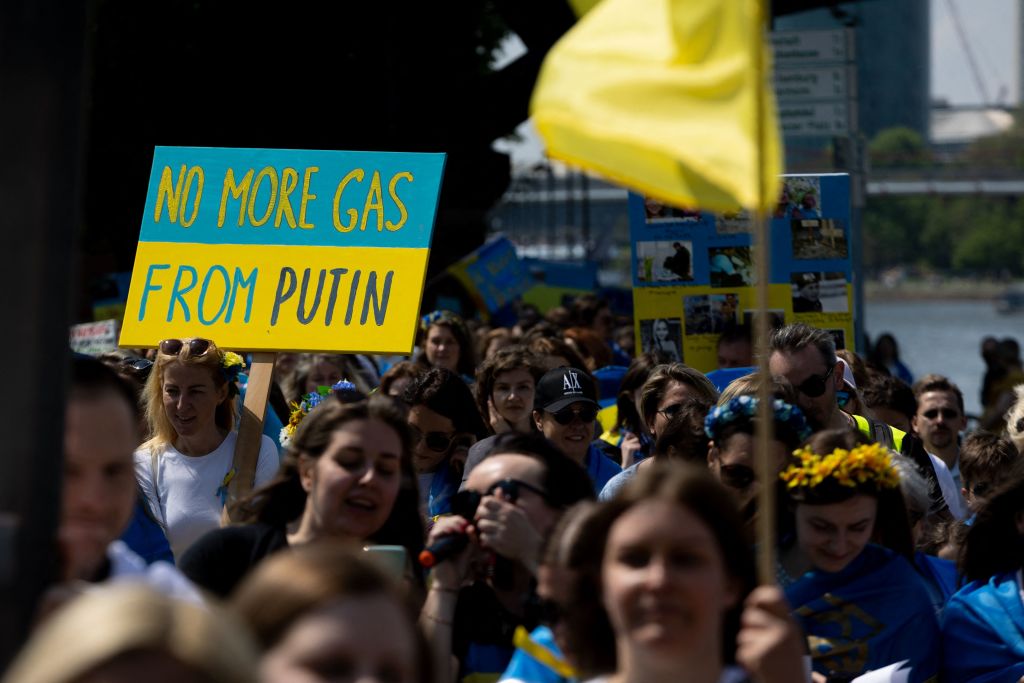Russia's weaponization of oil and gas exports to neuter Europe on Ukraine is backfiring badly


A free daily email with the biggest news stories of the day – and the best features from TheWeek.com
You are now subscribed
Your newsletter sign-up was successful
Russian President Vladimir Putin's ploy to use oil and gas exports as "a weapon of financial war" in its campaign to conquer Ukraine "is increasingly backfiring, threatening the core of Russia's beleaguered economy and curtailing its geopolitical influence," The Wall Street Journal reports.
Putin had calculated that cutting off natural gas to Europe, and especially Germany, would leave Europe's economy in shambles and its citizens freezing, weakening the continent's support for Ukraine. But "warm weather and ample supplies from other producers have derailed that effort so far," and European gas prices on Monday fell to levels not seen since September 2021, the Journal reports. "The Russian oil industry, meanwhile, is having trouble adapting to a European Union embargo and a U.S.-led price cap on its crude."
Before Putin's Ukraine invasion, Russia provided Germany with 60 percent of its natural gas. This reliance on Russian gas "initially gave Moscow the upper hand in its economic war with the West," as energy prices shot up in Europe, "sending a gusher of revenue to Moscow," the Journal reports. "The money helped Russia fund the war in Ukraine and placate its population at home with handouts." Oil and gas provided 45 percent of Russia's federal budget in 2021.
The Week
Escape your echo chamber. Get the facts behind the news, plus analysis from multiple perspectives.

Sign up for The Week's Free Newsletters
From our morning news briefing to a weekly Good News Newsletter, get the best of The Week delivered directly to your inbox.
From our morning news briefing to a weekly Good News Newsletter, get the best of The Week delivered directly to your inbox.
Moscow cut off its pipelines to Germany in August, but this effort to "blackmail Berlin" has failed, Andrey Gurkov writes at Germany's DW. "Germany is starting 2023 without Russian gas, and with no need to worry about the loss," while Russia's state-owned Gazprom has lost its most important foreign customer. Berlin's expanding military support for Kyiv "can be seen as further, indirect evidence of the failure of Putin's 'gas special operation,'" Gurkov adds.
"The German problem, or the central European problem, was that ... half of [our eggs] were in the basket of Putin," German Economy Minister Robert Habeck said earlier in January. "He destroyed that."
China is buying more gas and oil from Russia now, but "Russia's pipeline gas exports to China are less than a 10th of what it used to export to Europe before the war," and "Beijing has yet to agree to a second pipeline carrying Russian gas," the Journal reports. Russian oil is selling at about half the global benchmark price, and the long, costly shipping routes to China and India, Russia's other main post-invasion customer, eat into Russia's ever-thinner profits.
A free daily email with the biggest news stories of the day – and the best features from TheWeek.com
Peter has worked as a news and culture writer and editor at The Week since the site's launch in 2008. He covers politics, world affairs, religion and cultural currents. His journalism career began as a copy editor at a financial newswire and has included editorial positions at The New York Times Magazine, Facts on File, and Oregon State University.
-
 The 8 best TV shows of the 1960s
The 8 best TV shows of the 1960sThe standout shows of this decade take viewers from outer space to the Wild West
-
 Microdramas are booming
Microdramas are boomingUnder the radar Scroll to watch a whole movie
-
 The Olympic timekeepers keeping the Games on track
The Olympic timekeepers keeping the Games on trackUnder the Radar Swiss watchmaking giant Omega has been at the finish line of every Olympic Games for nearly 100 years
-
 TikTok secures deal to remain in US
TikTok secures deal to remain in USSpeed Read ByteDance will form a US version of the popular video-sharing platform
-
 Unemployment rate ticks up amid fall job losses
Unemployment rate ticks up amid fall job lossesSpeed Read Data released by the Commerce Department indicates ‘one of the weakest American labor markets in years’
-
 US mints final penny after 232-year run
US mints final penny after 232-year runSpeed Read Production of the one-cent coin has ended
-
 Warner Bros. explores sale amid Paramount bids
Warner Bros. explores sale amid Paramount bidsSpeed Read The media giant, home to HBO and DC Studios, has received interest from multiple buying parties
-
 Gold tops $4K per ounce, signaling financial unease
Gold tops $4K per ounce, signaling financial uneaseSpeed Read Investors are worried about President Donald Trump’s trade war
-
 Electronic Arts to go private in record $55B deal
Electronic Arts to go private in record $55B dealspeed read The video game giant is behind ‘The Sims’ and ‘Madden NFL’
-
 New York court tosses Trump's $500M fraud fine
New York court tosses Trump's $500M fraud fineSpeed Read A divided appeals court threw out a hefty penalty against President Trump for fraudulently inflating his wealth
-
 Trump said to seek government stake in Intel
Trump said to seek government stake in IntelSpeed Read The president and Intel CEO Lip-Bu Tan reportedly discussed the proposal at a recent meeting
